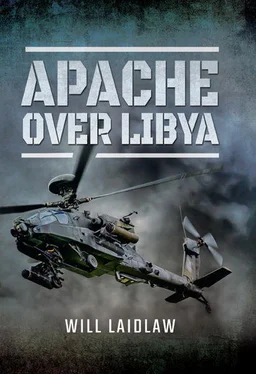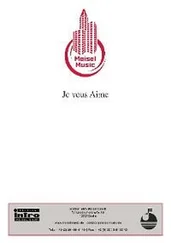Over, fortunately, sea state two, around lunch time on 3 May, the first of nine Hellfire was fired. We all had a go. We all hit our targets. Ocean and the Apache could arm, launch, strike, return, re-arm, launch, strike and return again. This was an unconscious dress rehearsal. The Royal Navy and the Ministry of Defence very quickly got the pictures of an Apache launching missiles with the sea as a backdrop, on the news and in the papers. One month to the day later, I fired the first Hellfire into Libya. Only in retrospect have I considered that 3 May was perhaps the first shot of psychological pressure being applied to Gaddafi: pictures of an Apache firing Hellfire into the same sea that washes his own shores. The threat of attack helicopters visiting Libya had begun.
By early May a No Fly Zone had been in force over Libya for six weeks. Disaster in Benghazi had been averted, but Libya was divided. Benghazi and the east were rebel-held. Everything else was contested, with three separate front lines all static in stalemate. Misrata, in the centre, had become a symbol of Libyan suffering. Gaddafi thrashed the population day and night. The telly kept on transmitting. What else could be done? The NEO was over. There were no more plans to dock ships or land planes. Nothing Ocean had on board would be needed. But several hundred Royal Marines were embarked, as well as Lynx, Sea King and Apache helicopters. We could intercept suspicious shipping, board and inspect the cargo. Perhaps they would need armed overwatch. We thought about this and worked out a rudimentary method of operating with Royal. Then we worked out a way of directing the Apache on to seaborne targets found on the radar of the Mark 7 Sea King. Again we ran up a method and had a quick airborne experiment. It all worked. We just needed someone else to need it, and if they didn’t it wouldn’t matter: we were developing good ideas for the future anyway. In the meantime, we carried on with the amphibious exercise, supporting Royal on manoeuvres.
After three weeks at sea, and well into the Mediterranean, Ocean drew up alongside HMS Albion in Chania, Crete for a couple of days’ re-stow and shore leave. Albion , along with HMS Liverpool , had sailed early to position as a contingency option. Liverpool had carried on and was now poised off the coast of Libya, spending much of her time at Action Stations and firing her 4.5in gun in response to the rockets that came out to meet her.
Going alongside in Crete meant our first opportunity to set foot on dry land since England, and no one was going to waste the chance. We were about to be indoctrinated into the legendary ‘First Night Madness’. Down on 6 deck in the Air Group accommodation Doug Reid was contemplating whether a cravat was needed or if the relaxed aesthetic of the open collar was right for an evening ashore, when Big Shippers emerged from his cabin completely sanitized. No watch, no phone, no wallet; he wore sandals, shorts and a polo shirt.
‘Mate, what am I doing wrong?’ Doug mocked him, flicking imaginary dust from his shoulder.
‘Well, gentlemen, you pay for the taxi and I’ll tell you how to get though First Night Madness.’ Then Big Shippers told us how it would unfold:
We’ve been in a ship for a little while, and there is the shore. The ship is tied to the shore and we may proceed ashore. Here are the Golden Rules of First Night Madness:
1. First nighters is for one night, but may be repeated until the ship sails, except for those that fail to observe rule 5.
2. 6Ps – prior planning prevents and all that. Rendezvous in the wardroom first for a few drinks before boarding the liberty boat. This ensures you are the best looking and most amusing person ashore.
3. Dress to survive – attire should be flexible to allow smooth transition from dinner in harbour-side taverna, sipping cocktails in 5-star hotels, dancing like your dad in a club, entertaining on cruise ships and breakfast of pizza and beer overlooking the Mediterranean. Maroon moleskin trousers, Ralph Lauren shirt and sports jacket are NOT appropriate for first night madness.
4. Sanitize – only take what you can afford to lose: cash and ID card. Never, ever take your mobile, ’nuff said. Phones are bad, they make you call home and then apologise pathetically long after she has hung up because you don’t know its four in the morning back at home in Somerset.
5. Know your limits – exceeding them might limit your port visit to one night only and may require a parade on the flight deck in the blazing sun with a hangover.
6. Doubles only – there’s not much time, bourbon or chips.
We did proceed ashore. It was messy. We’ll leave that in Chania.
The following morning, the entire Ship’s Company, Royal and Air Group – all 690 of us – were on the flight deck giving the XO a very hard listening-to. First nighters had been strong. Rumours of the night spread quickly. Some individuals were in trouble, some were in jail. Fortunately, someone else had let their hair down just an inch more than we had, the heat was all theirs and we were in the clear. There was no second nighters, and on the third night we let slip and sailed east for Cyprus.
Before Ocean left Chania our tenth pilot arrived. Josh ‘JB’ Charles strode up the gangway, returning to an old friend. Recently refreshed after a break from the aircraft, he had been part of 656 at its Apache beginnings, flown the decks and been among the first into Helmand right at the start with 16 Air Assault Brigade in 2006. He was the senior citizen rock star of the team and had lived the Army man and boy. Having joined at seventeen as a soldier and dashed around Germany in the 1980s in a tank, he decided to give flying a go as a corporal. It worked and he discovered his talent. JB cantered through the ranks, proved himself as 656’s first Apache instructor and was later given the daunting role of Regimental chief flying instructor in the first Apache regiment. He had had a brief break and now it was time to come back. He shoehorned an Apache refresher course into his Easter leave and flew out to Crete to join the ship. He arrived, just after first nighters, duffle bag on shoulder, laptop under arm, and announced with a wide smile, ‘This is going to be fun, again.’ An A1 graded instructor, the only A1 in the Attack Helicopter Force, JB was absolutely sound and knew both the aircraft and flying to an extraordinary level.
Complete, we sailed east and prepared for exercises in support of Royal. We would be home in a month.
Chapter 4
We’re Not Going to Albania
On 24 May the senior men in Ocean and I were invited to HMS Albion , the fleet flagship and the command and planning vessel, to discuss the next phase of the exercise – a morning to be spent listening to planners talk about diplomatic clearances, the availability of firing ranges and, hopefully, the carrot of a run ashore in Malta or Gibraltar on the way home.
I climbed out on to the flight deck along with the Captain and the Air Group Commander. We flew in a Lynx, a high-powered passenger list, and me. We could see Albion from the flight deck of Ocean , and beyond her Sutherland escorted us, all heading east. The flight lasted all of three minutes, neatly touching down on Albion to be met, it seemed, by everyone with a badge and a rank. The Royal Navy exchanged deference, paying exquisite attention to their traditions, and stepped inside. I followed. As I got through the double airlock doors Chris James, our Apache planner in Albion, grabbed me.
‘Steady on, sailor. They have business with the Commodore. You shall come with me.’ He gestured with mock theatricality and slid down a ladder. ‘Come on, this is good, really good.’
Читать дальше












